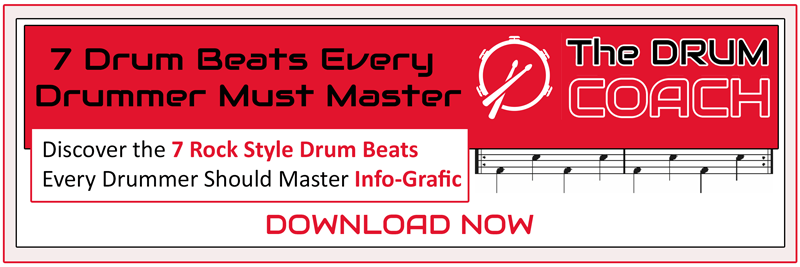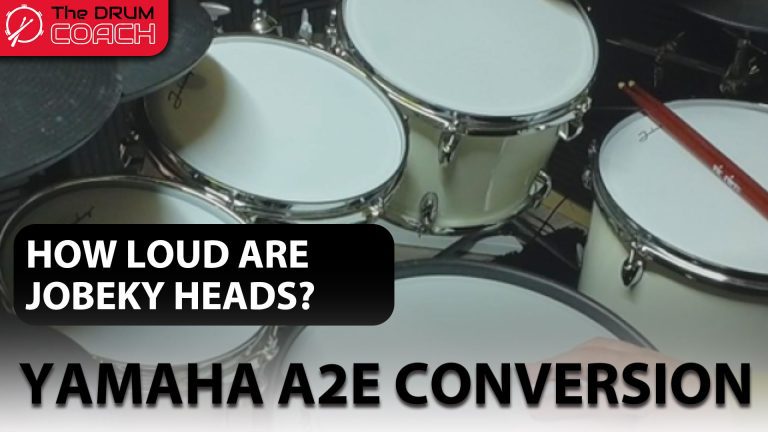I must admit, I never used ear drumming ear protection in almost 40 years of drumming. Why? Well, I never felt the need, but to be honest, my drumming suffered because of it. What do I mean by that? Again, I never felt the need to wear ear protection of any kind. Because I did most of my practice wearing headphones. That enabled me to hear the music I was practicing along to. And at the same time, this dampened the sound of the external drums. From that standpoint, I could then focus on the drumming. (because the music was coming through the headphones). And play.
Those opening statements are a non-sequitur because the headphones did dampen the drums. And so was a form of ear protection. So apologies for that little white lie. What I meant to say is that I never used ear protection on any of the gigs I did. And like I said, my drumming suffered because of it.
This was more of a state-of-mind thing. Because I usually found myself almost deafened by the wailing sound of the guitar. The guitar in most of the bands I worked with at an early age was almost always a problem for me. You may find that out for yourself one day if you get to work with a stubborn guitarist. Who loves the sound of his guitar above all else. But I hope that you do something I never did. Use drumming ear protection.
Wearing drumming ear protection could have solved all my problems. Because using something like earplugs would have dampened the high screeching noise. And left me better able to hear the bass tones. Which I always struggled to hear.
So do yourself a favor and protect your ears. It will help you to focus more on the rhythm section than the guitars. And when it comes to the question…
Why Do Drummers Need Drumming Ear Protection
The simple answer is: Because they will play better drums by doing so.
And of course, there are other nuances to that answer which we will cover here. All this is really meant to inspire the drummer to use ear protection. Even though some of the higher tones may be missing from the sound of an acoustic kit and other instruments. But that problem is also solved using one of the solutions mentioned below.

But for now, let’s stick to the basics. Drumming ear protection is essential for anyone who works in a noisy environment. And that includes drummers. Drummers are constantly exposed to high levels of noise when they play. And over time, this can lead to hearing problems and possible loss of hearing.
Besides, loud noise can cause tinnitus, a condition that causes Ringing in the ears. And we all want to avoid that.
While some drummers may be tempted to turn up the volume to drown out the noise. This can actually make the problem worse.
That’s why it’s important for drummers to wear earplugs or earmuffs of some kind when they play. By doing so, they can protect their hearing and enjoy their music for years to come.
Are Drums Really That Noisy Anyway?
But something is worth mentioning here. From my own perspective, I still believe it to be valid. That is, I never played any drum kit that made me think, “Woah, that thing is darn loud”. That was because I was always on a never-ending journey to get great-sounding drums. And other equipment such as cymbals.
So from my perspective, it isn’t the drums that are noisy. In most art, it’s other instruments that force the drummer to play loudly. Sure, when you hit a drum it is noisy. But when you play a drum… well, that’s a whole other matter.
Sure, they aren’t the quietest things for your family members to hear in the background, as they’re watching TV. Mostly because the noise the drums create is out of their control and most likely a shock to their system.
But as the drummer, you know you are going to strike those batters and so you prepare for the sound. Notice I say “the sound” and not noise.
Drums Enhance The Silence
This brings me to a quote that has found its way onto notepads and even clothing items. And to be frank is a negative thing and not one to brag about as the designers try to impart with those items. These T-shirts and other items have the words “I Destroy Silence” plastered on them.
Now, of course, the drummer who proclaims that to be true is nothing but a thrasher. What a drummer should do is “enhance the silence”, not destroy it. I’m aware it’s supposed to be some kind of joke but it projects noise into the drummer’s mind. And at the same time degrades what he is supposed to be doing with those sticks. Creating music. But maybe I’m a bit stuffy?
And that is what I always perceived I was doing in my pursuit of a great-sounding drum kit. Enhancing the silence and filling it with music. I wasn’t searching for the noisiest sounds I could find. Instead, I was searching for the most groovy sounds I could create. Noise… had nothing to do with it. That isn’t to say that drums don’t make any noise, they certainly do, but it’s all a matter of perspective. And a perspective needs choosing. So, do you choose noise or music?
I digress…
What I am trying to say is that a well-tuned drum kit. With quality drum heads, good sticks, and some good dynamic playing is never noisy.
But in the interest of this article, let’s presume that they are noisy. The perspective suggested here may begin to move you towards creating enhanced silence. Rather than destroying it. In yours or others’ ears.
Different Types Of Drumming Ear Protection Available For Drummers
Needless to say, drumming can be loud in the wrong circumstances. And so, extended periods of exposure to high noise levels can result in various hearing problems and potential damage to the auditory system..

There are two main types of drumming ear protection: in-ear monitors and earplugs. With headphones and ear mufflers being a slightly less beneficial option.
Headphones don’t so much cut external noise out but they can muffle the acoustic drums a little.
Especially if you use a high-quality pair.
Industrial-style mufflers or headphones without speakers are not really suitable. But they can serve as protection in a practice room for instance.
If nothing else, they get your mind and ears accustomed to the muffled sound of drums as you play them. Whilst you’re wearing the mufflers. Earplugs, much like industrial-style mufflers do pretty much the same as headphone-style mufflers. They muffle the sound and can cause a loss of clarity.
In-ear montors though are my favorite choice. They fit snugly into your ear and as well as muffling the external sounds. They provide a clear, accurate, high-quality sound when you create the right mix for them.
So from this, we have two options, either in-ear monitors or earplugs of various kinds. Both types of drumming ear protection have their own advantages and disadvantages. So it’s important to choose the right type for your needs. Whether you’re looking for clear sound or the greatest noise reduction. In-ear or earplugs are the only real options available.
Earplug Option
Ear plugs come in different sizes and shapes, with different levels of muffling. Some earplugs are designed to fit snugly into your ear canal, while others fit over your entire ear. There are also earplugs that fit into your ear canal and have a small cord that goes behind your head. These earplugs are connected together so that they stay in place, even if you are sweating.
Earmuff Option
As mentioned, earmuffs are another option and are usually worn over your entire ear. as they have cushioned ear cups that help to block out the noise.
In-ear Monitor Option

You most likely guessed by now that in-ear monitors are my favorite option. Earplugs and earmuffs have too much of a muffling effect for me.
The in-ear monitor option though does have muffling abilities. To varying degrees, depending on the filter you apply. See the Drum Coach in-ear article.
But they offer the added benefit of allowing various instruments into your ear. So you can hear what you want to and muffle the noise that you don’t. You would do this by sending a specific mix of instruments into your monitors.
Whichever type of drumming ear protection you choose, make sure that they are comfortable. And that they don’t interfere with your playing.
My personal guidance would be to follow these…
5 Tips For Keeping Your Ears Healthy While Drumming
- Invest in a good pair of earplugs, earmuffs, or both. When you’re rehearsing or performing, make sure to wear them. This option is relatively cheap and so it’s not such a financial burden. For the cost of a pair of drumsticks, you can likely obtain each item. So as soon as you can, get some and use them whenever the other options aren’t available
- Take breaks from your practice often. If you feel your ears starting to ring or feel pain. Then step away from the drums for a few minutes, take a walk, and get some fresh air.
- Keep the volume down wherever possible. When you’re practicing at home, try using practice pads instead of full-size drums. This will help reduce the noise level without sacrificing precision. When you are at a gig, set your drums up as far away from the guitar amp as possible. And use muffs or plug in your ears.
- Be sure to get your hearing checked often.
- Invest in a good quality in-ear monitor system. When your budget allows, invest in an in-ear system. For the times when your mufflers or earplugs are not good enough. Some situations may lend themselves to earplugs or earmuffs. But in-ear monitors lend themselves to more professional situations such as live gigs. Think about where you would use each and then try them all out. You could always get a cheaper set of in-ear monitors to get you started. And then build a specific scheduled system that suits you. So you make use of all of the options available.
By following these tips, you can enjoy drumming for years to come. All while keeping your ears healthy and happy.
Conclusion
Drumming is a great way to relieve stress and express yourself, but it can also be hard on your ears. To help you keep your hearing healthy, follow the 5 tips and get yourself the suggested plugs. Muffs, and in-ear monitors, or some other kind of ear protection for drummers as soon as you are able.
One last thing, consider using electronic drums. While they may not have the same acoustic sound as traditional drums, they can be much easier on your ears. Plus, there are many different sound options available with electronic drums. So you can still get creative with your playing. It’s another option available. I am of the mind that every drummer should own an electronic kit anyway. They do make excellent practice kits after all.
Following these tips and suggestions will help you enjoy drumming for years to come. Without damaging your hearing.
So what are your hear protecting choices? What precautions do you prefer? I’d love to hear them, leave a comment below and let us all know.
Thanks for listening. I hope this article wasn’t too hard on your ears!
The Drum Coach.




